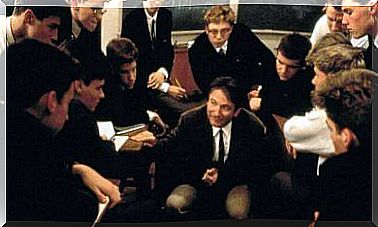Zeigarnik Effect: Anxiety About Unfinished Actions

The Zeigarnik effect reminds us that the brain does not like to do things by halves, or, even worse, to receive ambiguous or inaccurate information. This explains, for example, why we find it annoying to stop reading an interesting book. This characteristic would also be hidden behind the anxiety felt when being left by someone without explanation.
Film and television screenwriters are well aware of this psychological phenomenon. And that’s why they’ve been using the well-known Cliffhanger effect for decades to build audience loyalty. This technique consists, as you well know, in concentrating the maximum tension, the effect scenes and the emotions at the very end of the episodes or film productions.
Such a sudden and unexpected conclusion will force the viewer to wait for the new releases. However, it is also known that we often get tired of this ploy, as we understand the manipulative aspect of it. In any case, in everyday life it is almost impossible not to be subject to this sophisticated and interesting mental mechanism.
Cognitive psychology has always been interested in the Zeigarnik effect and intrusive thoughts that often visit us in the face of pending activities or unfinished experiences. Furthermore, this phenomenon could also explain why we repent more often than what we have not done than the actions we have taken.
The Zeigarnik effect and the Austrian restaurant

It is 1920, and we are in a small restaurant in Austria. Seated, there is a young Russian psychologist named Bluma Zeigarnik, a little impatient about the delay of her teacher, Kurt Lewin. At a certain point, Bluma stops looking at the clock and begins to participate, as a good scientific observer, in what is happening around her.
Immediately notice something curious: the waiters show an exceptional memory in remembering the requests of each customer. Regardless of the complexity of the combinations of courses or drinks, they are never wrong. However, Bulma notices something even more surprising: the moment customers pay the bill, the waiters instantly forget their orders.
Conversely, in their minds still remains every detail of those who have not yet gone to the cashier. In other words, the transactions not yet carried out represent the pending activities that the brain cannot forget, they are unpaid accounts, therefore impossible to forget.
The young Bluma Zeigarnik then returned to university and immediately began her famous study, published in 1927, with the title On Finished and Unfinished Tasks .

Zeigarnik effect: the anxiety caused by unfinished actions
It is often said that what is unfinished manifests its own intrinsic beauty. There is a certain melancholy and sadness in these actions, a strange anguish for all that, due to the circumstances, it has not been possible to complete or even undertake.
We can find works such as Franz Schubert’s Symphony No. 8 “Unfinished”, a wonderful composition according to experts, which the author was forced to abandon in half due to an illness.
These phenomena, such as feeling bad for not having the courage to enter into a relationship with another person, are what authors such as Savitsky, Medvec and Gilovich, 1997 describe as “painful omissions”.
All this causes, among other things, feelings of discomfort, anger or pain when others do not respond to our requests, when they promise things that they then do not keep or when love relationships are interrupted without fully understanding the cause of the abandonment.
The brain doesn’t like ambiguity
Schiffman and Greist-Bousquet (1992) conducted a study at the University of Michigan which demonstrated another feature of the Zeigarnik effect. The brain doesn’t like ambiguity. Not being able to finish a task generates anxiety, as well as not understanding it or receiving information that is ambiguous or that makes us question the above.
In the history of television the Lost phenomenon is always mentioned . This series, broadcast between 2004 and 2010, had a great psychological impact on many people and for several reasons, especially its ending. Many viewers find it too ambiguous and difficult to understand.
In this case the Zeigarnik effect was twofold. Many questions remained unanswered and the explanations given were not enough for many fans. But, perhaps, it was precisely this that generated the success and longevity of the series.
Zeigarniker effect: to conclude …
There is one aspect worth reflecting on: whether we like it or not, our daily reality and the texture of existence itself is woven by the Zeigarnik effect. There will always be questions that are unanswered, ambiguous and even inexplicable, or that will require personal inference, as in the case of the works of David Lynch.
We must be able to tolerate uncertainty and those gaps where logic is absent. Life is not a video game, that is, a world in which you can pause a fight to resume it later. Sometimes there are aspects that cannot be recovered and that remain forever in the universe of our mind. It is an aspect to consider.
In any case, it is always interesting to delve into these psychological phenomena, to better understand the metrics and uniqueness of our wonderful brain.









